Tips for Handling the Rejection Letter

I do not mean to come off as overly idealistic. I can't feed, clothe, and provide compasses to all of the lost, broke, talented, and up-and-coming writers out there anymore than I can sustain myself. What I can do, however, is talk about submitting to literary journals from an empathetic standpoint, if only because for the last nine months I have done nothing but sit, write, workshop poems in a weekly group, and submit.
The past year has netted some great results. It has also netted some failures, known as form letter rejections or emails. Here is how to get back on that eternally bucking literary pony and ride it through the rejection surf:
- You aren’t sending out enough. When you first start sending out your work, I encourage you to simultaneously submit but only to those journals that allow it. Keep track of the journals that you send to. Withdraw individual poems once they are accepted, but until then? Think of yourself as being alone in a desert or forest, cut off from all natural resources. That’s how it is when you’re a post MFA emerging writer. You need to take that big pile of poems that’s been sitting there on your desk for the last three weeks, and spread them around, or save your best poems for excellent journals that refuse simultaneous submissions.
- You take rejection too personally. Don’t. I assume you take your craft seriously. If you take your craft seriously, and you try hard enough, then guess what? Someone else, like an editor of a reputable journal, will someday also take said work seriously!
- Your formatting or aesthetic is wrong for the magazine. If you have read my poems (www.marianazos.com/poems), you will see that my lines are sixteen syllables long or more. Once I submitted to a well-distributed, well-respected literary review, and I got a rejection with a handwritten sentence, “Your lines are too long for our magazine’s size.”
Really. I thought to myself. So, the first time around, that could have been a contributing factor? The answer is sometimes a resounding yes. Many editors simply will not publish your poem due to limited space in the journal. I’ve had to reformat my long, breathy lines twice already, chopping them down to fit a perfect-bound journal.
- The editor is having a bad day. Editors are people. Just like us. They have good days, great days, bad days, and so-so days. They get indigestion, have fights with their partners, and their toilets overflow. They have car insurance to pay, dogs to walk, food to cook.
I always had this image of editors sitting in a Manhattan-based office with black berets, enveloped in a cloud of clove cigarettes. Sometimes, I envisioned all editors as tenured professors at reputable universities who have the time to read each poem with the kind of careful attention to quality and craft. Here's the deal: editors embody all kinds of people. We try our best. Sometimes a good poem slips through the cyber-cracks; sometimes it just isn't our cup of tea. And yes, sometimes, the work just is not good enough.
As for any handwritten rejections that you receive? This note equals encouragement, but never a guarantee of an acceptance if you resubmit to the journal. So treat these kind words like the hot date who never called you back: keep a fond memory, don’t try to read too deeply into the tone, and chalk it up to your growing experience.
- You didn’t send your best work. Be brutal with yourself. Did you send them your best, polished, roaring, crazy, singing poetry? Or were you so eager to send something off that you send a semi-revised sonnet with sloppy line-breaks? Before sending anything out, take your poems though a rigorous process of revision.
Here's my process: write the poem. Revise it some, thirty to fifty times—that has been my magic number, but I am sure you have your own—then let the poem sit for a few months. Pick it up again and read it in a detached manner. Make one last editing change, then show the piece one last time to an MFA workshop, online, to a trusted friend, etc. As writers, we are the worst judges of our own work. We need a different pair of eyes, if not several.
- You didn’t see what kind of work the magazine published. For all you know, your work could be too edgy, too Language-y, too confessional, far too formal, too long, far too short. Realistically it is impossible for us to go out and subscribe to all the amazing journals out there. That said most journals contain some sample poems on their page. And if you are going to spend money on anything, a subscription to a good journal costs as much as three lattes. As my grandmother used to say: "if you want to get love, you've got to give love," so show these venues some love.
The Association of Writers and Writing Programs is a great resource for purchasing discounted literary journals. Make a list of journals that you would die to have your work appear in. Then hit up each table, buy those issues, and read them thoroughly. Ask yourself: is this the kind of journal you’d want to see your work appear in? Is this the kind of journal, moreover, that would publish your work?
If there is any other advice that I can offer, it is this: fail magnificently. When you get that deflating email, throw a shoe, get a drink, and then begin the arduous process again. Although there is no formula to anything, the most successful writers I know generally share two qualities: self forgiveness and patience. It is a choice to put your work out there, and in a world where the humanities are struggling, the act of writing, submitting, and subscribing is an all sustaining endeavor. Nobody owes us anything—acceptances or otherwise—because we chose to become writers. Meanwhile we can choose to fail magnificently as we stumble on.
Maria Nazos is the author of A Hymn That Meanders, (2011, Wising Up Press) and the chapbook entitled "Still Life," forthcoming in February 2016 from Dancing Girl press. Her poetry, translations, and lyrical essays are published or forthcoming in The North American Review, The Florida Review, The Southern Humanities Review, Subtropics, The Drunken Boat, The New Ohio Review, Poet Lore, The Sycamore Review, and elsewhere. She is currently a doctoral fellow studying Creative Writing at the University of Nebraska. She can be found at www.marianazos.com.
Christian Blaza is an illustrator based in New Jersey. Christian graduated Montclair State University in May 2015 with a 3.618 GPA. Along with receiving a BFA in Animation/Illustration, he was awarded Excellence in Illustration by the Department of Art & Design for the class of 2015. Interested in editorial, sequential, and fantasy illustrations
Recommended
The Shirt
After Hearing David Rothenberg Sang with Birds
Frothing Pink Poodle Droppings





